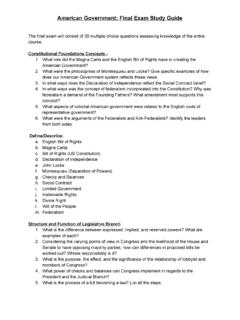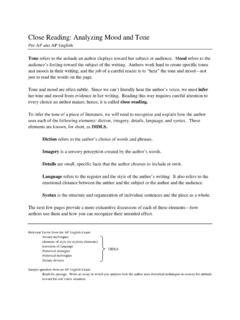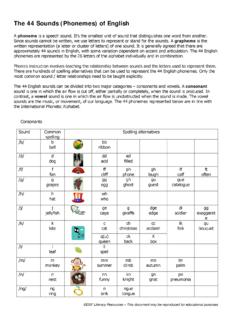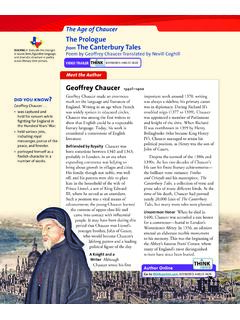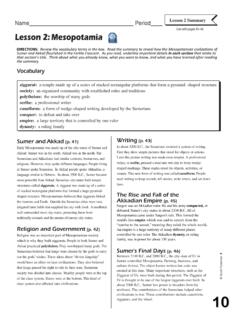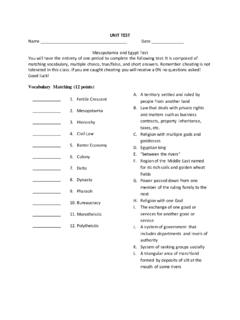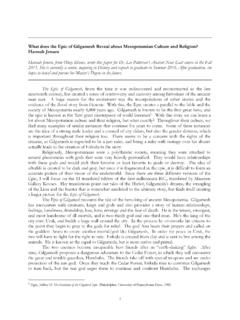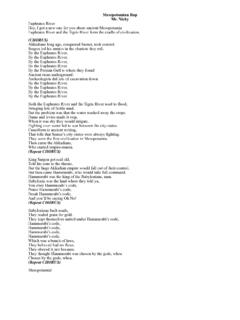Transcription of Culture and Society in Ancient Mesopotamia
1 Culture and Society in AncientMesopotamia"The Walls of Babylon and the Temple of Bel (Or Babel)," by 19th-century illustrator William Simpson. Influenced by earlyarchaeological investigations. From Wikimedia. Mesopotamia was an Ancient area in the Middle East. Today, most of it is located in thecountry of Iraq. The word Mesopotamia comes from a Greek word meaning "between two rivers." Those arethe Tigris and the Euphrates rivers. The land was later known as the Fertile Crescent byhistorians, as its soil was good for farming. The Cradle of CivilizationAncient peoples in Egypt and Greece shared many beliefs and ideas.
2 However, Mesopotamiahad many different cultures and peoples. Even so, Mesopotamia is known as the cradle of civilization. That is mostly because of twothings that happened in the Mesopotamian region of Sumer around 3000 the first city,and the invention of Ancient History Encyclopedia, adapted by Newsela staff on Word Count 901 Level 810L This article is available at 5 reading levels at were not their only inventions. Mesopotamian people are also said to have invented thewheel, the farming of animals, farming, tools, weapons, the chariot, wine, beer and have found settlements from 10,000 in Mesopotamia .
3 These show thatthe fertile land allowed people to settle in and start farming. Trade soon followed andsettlements grew into the first cities. It is generally thought that writing was invented due totrade. It also helped people send messages far away and helped them keep track of and religionMesopotamia was a place of learning. There were as many schools as temples. They taughtreading, writing, religion, law and were more than 1,000 gods in the Mesopotamian cultures and many stories aboutthem. The Mesopotamians believed that they worked with the gods. To them, the land was fullof world began, they believed, when the gods defeated the forces of chaos and , even though the gods had won, this did not mean chaos could not come again.
4 Thepeople of Mesopotamia wanted to keep the gods happy so the world would stay balanced. Todo this, they followed daily routines, said prayers, and made sure to bury the dead were taught to respect the gods in the work they did every and women both worked in Mesopotamia , and most were involved in farming. Otherswere healers, weavers, potters, shoemakers, teachers and priests or priestesses. The highestpositions in Society were kings and military had almost the same rights as men. They could own land, choose to divorce, owntheir own businesses, and make deals in trade.
5 Women were among the first people to makebeer and wine. They were also healers in the community. These jobs were later taken over bymen, it seems, who saw that women were making so much money. The work someone did, was also seen as giving back to other people, and for making thegods happy. This could keep the world at and governmentMesopotamia gave birth to the world s first cities. The land did not have trees. So,buildings were mostly made of soil, which was dried in the sun and turned into bricks. With thebricks, the Mesopotamians created the world s first columns, arches and roofs.
6 A temple was usually at the center of every Mesopotamian city. Cities and temples werefamous for their ziggurats. These were pyramids built in layers of article is available at 5 reading levels at gods were thought to be watching over any building project. It was important to carefullysay prayers to the right gods to make sure building was successful. The first king came into power at some point after 3600 The king worked directly with thepeople and made the laws himself. Before the first kings, priests were rulers. They were believed to have gotten messages fromthe gods to make laws.
7 Soon, the king was also believed to be speaking with the gods, andable to know their kingKing Hammurabi of Babylon was a Mesopotamian king who made the earliest written set oflaws known to us today. These laws were said to come from the gods. Akkadia was anotherMesopotamian kingdom, and the Akkadian King Naram-Sin even said he was a god himself. The king was responsible for the happiness and growth of his kingdom. If a king ruledaccording to a god's wishes, it was said he would be rewarded with a rich, booming , even a very good ruler had to deal with constant rebellion by groups who claimed he wasnot the true king.
8 Mesopotamia had so many different peoples and ideas. A single ruler would have troubletrying to please everyone people would disagree with him influence of Mesopotamia lives on today. The idea of 60 seconds being in a minute, and60 minutes in an hour, was invented by Mesopotamians. Priests were always watching for special events happening in nature. These were seen assigns from the gods they said if a community was doing good or Sumerians, an old Mesopotamian group, believed that each god was represented by anumber. The number 60 was sacred to the god An.
9 This number was used often back became experts in farming and water control. This allowed them to farm hugeamounts of food and save it for times when crops were not growing as well. This helped largecities to grow and sustained many cities and great palaces are of Mesopotamia are long gone, but its people gave the worldmany important ideas that live on article is available at 5 reading levels at


